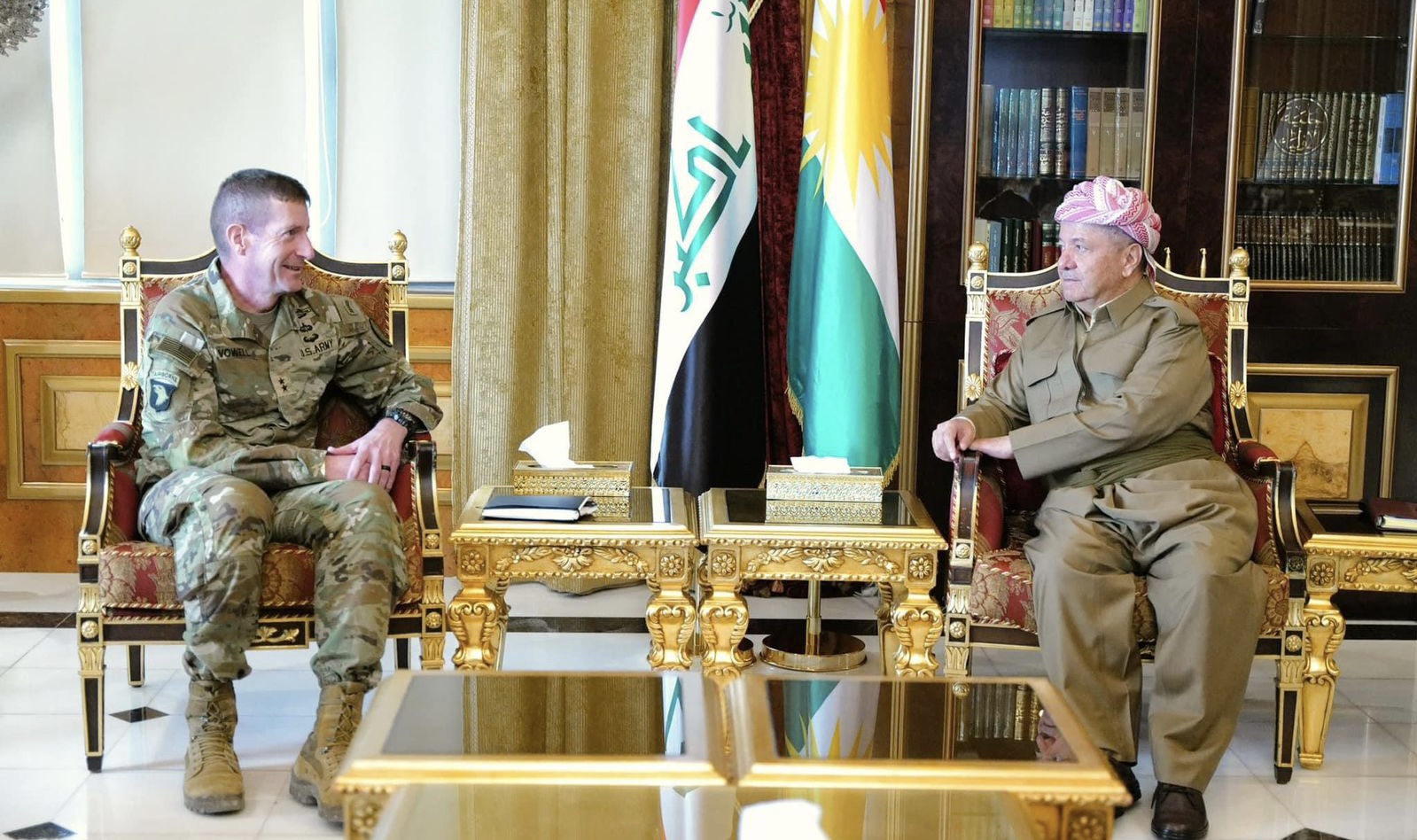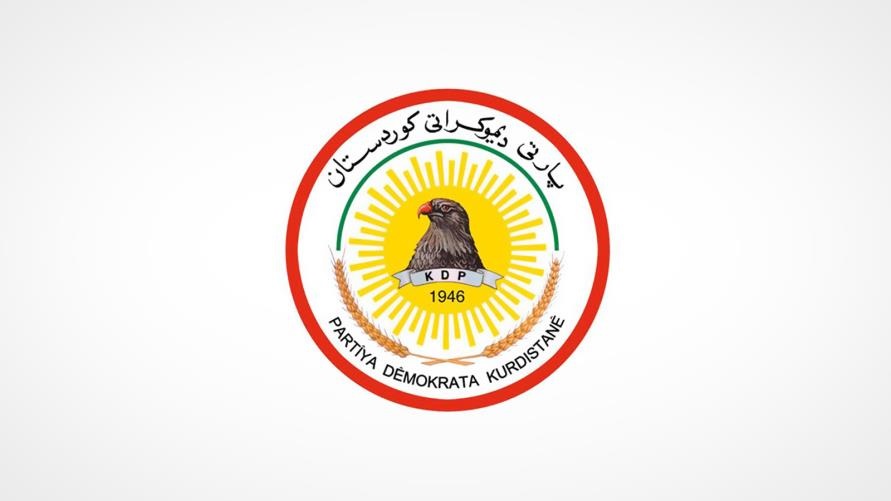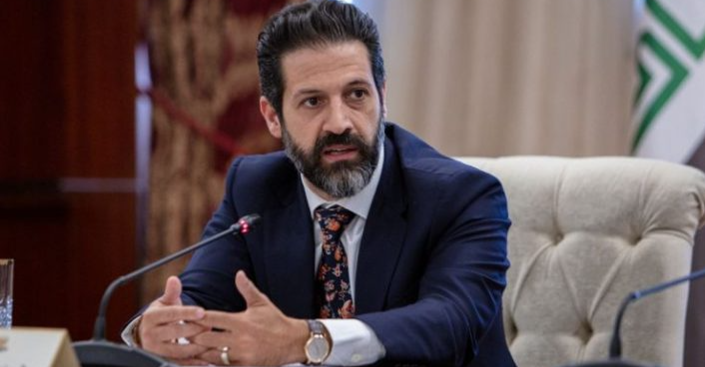Masoud Barzani says Coalition forces should stay in Iraq, Syria

Shafaq News/ Kurdish leader Masoud Barzani on Tuesday said he continues to support the mission of the foreign forces fighting against ISIS in Iraq.
Barzani's remarks came during a meeting with the commander of the international coalition in Iraq and Syria, US General Joel B. Vowell, in Erbil earlier today.
According to a readout issued by his bureau, Barzani discussed with his guest the evolving security landscape, with the looming shadow of resurgent terrorism in Iraq.
"Recognizing the potential re-emergence of the Islamic State as a grave threat, Barzani and Vowell pledged to take every necessary measure to ensure their definitive eradication," the readout said.
The two leaders concurred on the importance of maintaining seamless coordination between the Coalition forces, the Peshmerga, and the Iraqi army in this critical phase. The also laid emphasis on sustaining the Coalition's presence in Iraq and Syria in order to achieve this quest.
Last Friday, Iraqi Prime Minister Mohammed Shia al-Sudani announced he will remove about 900 US-led coalition forces from his country, saying that "the justifications for its existence" — the threat of the Islamic State, or ISIS — "have ended".
Al-Sudani announced that he would put together a “bilateral committee,” which includes members of the coalition forces, charged with ending their presence in the country, Reuters reported Friday. But it’s not clear that al-Sudani and the Iran-linked political blocs crucial to his appointment as prime minister will actually be able to push coalition forces out, though it may succeed in limiting their ability to operate in the country and the wider region.
The announcement came just a day after the US killed Mushtaq Jawad Kazim al-Jawari, also called Abu Taqwa, who the Department of Defense said was a leader of Harakat al-Nujaba (HaN), a Shia militant group associated with Iran and responsible for attacking US installations in Iraq and Syria. Other reporting has identified Abu Taqwa as Mushtaq Taleb al-Saeedi. The Pentagon confirmed the identity of Abu Taqwa as al-Jawari, but did not confirm the identity of a second person killed in the attack, beyond his affiliation with Abu Taqwa and HaN.
Such attacks have occurred in varying tempo and intensity for years now, ramping up again following Israel’s war with Hamas in Gaza after the October 7 attacks. Pentagon leadership has maintained that Abu Taqwa was “actively involved in planning and carrying out attacks against American personnel.” But given that Harakat al-Nujaba and groups like it are technically part of the Iraqi military, al-Sudani’s office called Thursday’s strike an “unwarranted attack on an Iraqi security entity that is operating within the powers authorized by the Commander-in-Chief of the Armed Forces.”
In Iraq, as in the Red Sea, US coalition forces are hamstrung regarding how to respond to attacks like those of Harakat al-Nujaba and the Houthis. Failure to respond has not deterred the attacks, but neither have limited strikes — for example, targeting munitions depots in Syria. But more aggressive attacks, like the one Thursday that killed Abu Taqwa, could have undesirable consequences, such as increased attacks on US installations or on commercial containers in the Red Sea — and risk further escalation in the region overall.
The US-led Global Coalition to Defeat ISIS was formed in 2014 to dislodge ISIS from the territory it controlled in parts of Iraq and Syria. The group imposed an extremist interpretation of Sunni Islam over its so-called caliphate, forcing conversions, executing those who opposed them, committing genocide, kidnapping and killing journalists, and executing terror attacks on Western targets.
In March of 2019, a grueling five years later, Iraq managed to largely dismantle the ISIS infrastructure and eject the group from the territory it once held. In October of that year, ISIS leader Abu Bakr al-Baghdadi died during a raid by US special operations commandos in Idlib, Syria.
Though the coalition had ostensibly met its goals by that time — dismantling the caliphate, and killing the group’s leader and many commanders — ISIS itself didn’t die. That’s partly because affiliate groups still operate all over the world, including the Philippines, parts of Iran, Afghanistan, and Pakistan, in the Arabian Gulf nations, and in parts of Africa. And it’s also due to the fact that thousands of people associated with ISIS — former fighters as well as their wives and children — have been held at prisons and camps for the displaced and haven’t been repatriated yet.



